Related Research Articles
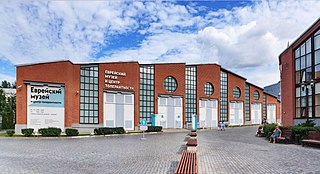
The history of the Jews in Russia and areas historically connected with it goes back at least 1,500 years. Jews in Russia have historically constituted a large religious and ethnic diaspora; the Russian Empire at one time hosted the largest population of Jews in the world. Within these territories, the primarily Ashkenazi Jewish communities of many different areas flourished and developed many of modern Judaism's most distinctive theological and cultural traditions, while also facing periods of antisemitic discriminatory policies and persecution, including violent pogroms.

The Jewish Agency for Israel, formerly known as the Jewish Agency for Palestine, is the largest Jewish non-profit organization in the world. It was established in 1929 as the operative branch of the World Zionist Organization (WZO).
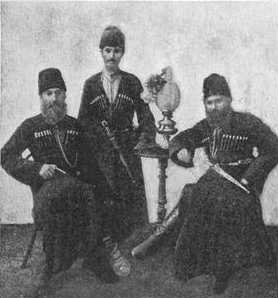
Mountain Jews are the Mizrahi Jewish subgroup of the eastern and northern Caucasus, mainly Azerbaijan, and various republics in the Russian Federation: Chechnya, Ingushetia, Dagestan, Karachay-Cherkessia, and Kabardino-Balkaria, and are a branch of Persian-Jewry. Mountain Jews took shape as a community after Qajar Iran ceded the areas in which they lived to the Russian Empire as part of the Treaty of Gulistan of 1813.
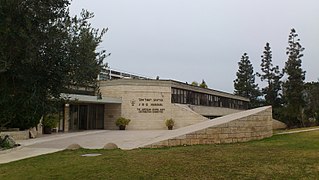
American Jewish Joint Distribution Committee, also known as Joint or JDC, is a Jewish relief organization based in New York City. Since 1914 the organisation has supported Jewish people living in Israel and throughout the world. The organization is active in more than 70 countries.

The history of the Jews in Ukraine dates back over a thousand years; Jewish communities have existed in the modern territory of Ukraine from the time of the Kievan Rus'. Important Jewish religious and cultural movements, from Hasidism to Zionism, arose there. According to the World Jewish Congress, the Jewish community in Ukraine constitutes Europe's third-largest and the world's fifth-largest.
The International Fellowship of Christians and Jews is a philanthropic organization founded in 1983 by Yechiel Eckstein whose stated mission is to promote understanding and cooperation between Jews and Christians, and provide humanitarian aid for the State of Israel. Since 2019, Yael Eckstein has been serving as The Fellowship's President and CEO.

Yaakov Dov Bleich is an American-born rabbi. He serves as Rabbi of the Kyiv synagogue in Podil since 1989. Rabbi Bleich was vice-president of the World Jewish Congress from 2009-2017. Bleich chose not to run for re-election as a member of the WJC Executive Committee at the WJC’s May 2021 plenary assembly.
The history of the Jews in the Jewish Autonomous Oblast (JAO), Russia, began with the early settlements of 1928.

Vadim Zinovyevich Rabinovich is an Israeli and formerly Ukrainian oligarch and Jewish community leader. He is a former leader of the banned Opposition Platform — For Life party, as well as an unsuccessful candidate in the 2014 Ukrainian presidential election and a People's Deputy of Ukraine from the 8th and 9th Verkhovna Rada convocations, serving as a member of the Opposition Bloc from 2014 to 2019 and as a member of Opposition Platform — For Life from 2019 until he was removed from office by the party for his support of Russia during the 2022 Russian invasion of Ukraine.

Yechiel Eckstein was an Israeli American rabbi who founded International Fellowship of Christians and Jews in 1983 and led it for many years. The objectives of the organisation were to support Jews in need of financial help, to promote emigration of Jews to Israel, and to support poor soldiers in the Israel Defense Forces. In 2003, it was listed as the second-largest charitable foundation in Israel by Ha'aretz.
Limmud International, a section of the Limmud organisation between 2006 and 2016, is a volunteer-led Jewish international organisation, based in London. It was initially chaired by Andrew Gilbert, then by Helena Miller and Uri Berkowitz, by David Hoffman and by David Bilchitz. At the end of 2016, Limmud ceased branding Limmud International as a separate project. In 2021, the UK charity Limmud decided to split off the role of supporting Limmud groups worldwide and so this function is now performed by the Limmud Global Board, which is a separate entity from the UK charity.

Limmud FSU is an international Jewish education organization that focuses on educating young Jewish adults that have roots in the Former Soviet Union about their Jewish identity and culture. It was developed in 2006 by Chaim Chesler, founder (Israel); Sandra F. Cahn, co-founder . Limmud was originally a British-Jewish educational charity, which produces a large annual winter conference at Warwick University and several other events around the year in the UK on the theme of Jewish learning.
"Khaybar, Khaybar, ya yahud! Jaish Muhammad soufa yaʿoud!" is an Arabic-language rallying slogan referencing the Battle of Khaybar of 628 CE, which began after Muhammad marched with a large Muslim army and besieged Khaybar, an oasis in present-day Saudi Arabia that was home to a notable Jewish community.
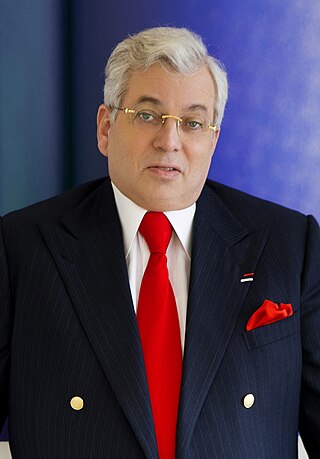
Aaron G. Frenkel is an Israeli businessman.

Arnon Mantver is an Israeli professional. who served as Director General of JDC-Israel from 1995–2014. In 2007, Mantver accepted the Israeli Lifetime Achievement Prize on behalf of JDC-Israel. Mantver has also held the following roles: Director General of the Department of Immigration and Absorption at the Jewish Agency (1989-1995); Director General of the Israeli Forum; Founder and Volunteer Chairman of Otzma; Manager of the Center for Immigration to Israel in the northwest United States.

The Menorah center is a cultural and business center of the Jewish community in Dnipro in Southern Ukraine. Some sources declare it to be the biggest multifunctional Jewish community center in Europe or in the world. The heart of the complex is the historic Golden Rose central synagogue, built in the 19th century.
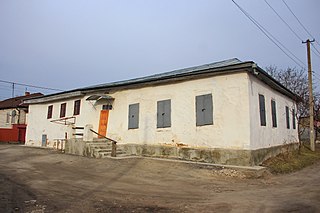
The Bershad Synagogue is an Orthodox Jewish synagogue, located on Narodna Street, in Bershad, in the Vinnytsia Oblast of Ukraine. Built in the beginning of the 19th century, it is one of the very few synagogues in Ukraine that was neither destroyed during World War II nor closed by the Soviet authorities in the years after the war.

Jonathan Benyamin Markovitch is the chief Rabbi of Kyiv, official representative of Lubavitcher Rebbe Menachem Mendel Schneerson and the official Rabbi of the country's prisons.
The history of the Jews in Kharkiv dates to at least 1734, when the Russian Empire allowed Jewish merchants to visit the city to engage in retail and trade. Unusual for major Ukrainian cities, there were no pogroms in Kharkiv during the Tsarist era.

Anatevka is a Ukrainian refugee village that provides food, housing, education, and medical support for refugees of the 2014 Russian invasion and the 2022 Russian invasion of Ukraine. The village was established in 2015 and currently houses hundreds of families. The village was established by Harav Moshe Reuven Azman, the chief rabbi of Ukraine and Kyiv.
References
- ↑ Liphshiz, Cnaan (4 October 2012). "Funds for Ukrainian Survivors Bring High Hopes". Times of Israel. Retrieved 15 February 2023.
- 1 2 Sokol, Sam (19 September 2014). "Unable to flee, elderly Jews remain behind in eastern Ukraine". Jerusalem Post. Retrieved 17 February 2023.
- 1 2 3 Tighe, Elizabeth; de Kramer, Raquel Magidin; Bleckman, Dina; Nursahedov, Begli; Saxe, Leonard (2012). Hardship And Needs Of Elderly Hesed Clients: An Analysis Of Clients Served By Hesed Service Centers In Russia & Ukraine. Boston, MA: Brandeis University. pp. 27–34. Retrieved 16 February 2023.
- 1 2 3 Weiner, Anita (2003). Renewal : reconnecting Soviet Jewry to the Jewish people ; a decade of American Jewish Joint Distribution Committee (AJJDC) activities in the former Soviet Union ; 1988-1998. Lanham, MD: University Press of America. pp. 176, 205. ISBN 9780761824763.
- 1 2 Radler, Melissa (17 October 2003). "Acts of kindness". Jerusalem Post. Retrieved 17 February 2023.
- ↑ ZIieve, Tamara (3 April 2017). "Scores help reach out to elderly, needy Jews in Ukraine". Jerusalem Post. Retrieved 23 February 2023.
- 1 2 3 Shachtman, Tom (2001). I Seek My Brethren: Ralph Goldman and 'the Joint' : Rescue, Relief, and Reconstruction. New York: New Market Press. p. 240. ISBN 1557044953.
- 1 2 3 4 Harrison, Andrew (2003). "Book Review: Renewal: Reconnecting Soviet Jewry to the Jewish People; A Decade of American Jewish Joint Distribution Committee (AJJDC) Activities in the Former Soviet Union, 1988-1998". American Jewish History. 91 (1): 191–193. doi:10.1353/ajh.2004.0029.
- ↑ Alleson, I. (2006). "[Review of Social Disaster as Opportunity: The Hesed Model, by J. Mirsky, R. Kaufman, & A. Avgar]". Voluntas: International Journal of Voluntary and Nonprofit Organizations. 17 (4): 377–378. Retrieved 17 February 2023.
- ↑ Maltz, Judy (1 May 2022). "The Woman Who Oversaw the Rescue of 250 Ukrainian Jews From the Russian Border". Haaretz. Retrieved 17 February 2023.
- ↑ Khanin, Vladimir (2002). "Institutionalization Of The Post-Communist Jewish Movement: Organizational Structures, Ruling Elites, And Political Conflicts". Jewish Political Studies Review. 14 (1/2): 11–12.
- ↑ "Top Russian Rabbi Says NGO Crackdown Worries Jews". Forward. 29 September 2015. Retrieved 15 February 2023.
- ↑ Katz, Esther (1 January 2004). Hesed Evaluation Study: Jewish Identity, Community Orientation and Voluntarism: Report Number 5: Findings from an In-depth Study of Hesed Directors and Jewish Community Representatives (PDF). Jerusalem: JDC-Brookdale Institute. Retrieved 22 March 2023.
- ↑ Borschel-Dan, Amanda (6 March 2014). "Crimean Jews Surprised by New Referendum to Join Russia". Times of Israel. Retrieved 16 February 2023.
- 1 2 Surkes, Sue (2 March 2022). "Risking Life and Limb, Hesed Network Continues Caring for Ukraine's Neediest Jews". Times of Israel. Retrieved 15 February 2023.
- ↑ Liphshiz, Cnaan (22 February 2022). "Odessa's Rabbi, Responsible for 250 Kids in 3 Orphanages". Times of Israel. Retrieved 16 February 2023.
- ↑ Avgar, Amos; Mirsky, Julia; Kaufman, Roni (2006). "Chapter Three: From Model to Movement: The Development of Hesed Centers in the Former Soviet Union". In Mirsky, Julia; Kaufman, Roni (eds.). Social Disaster as Opportunity: The Hesed Model. Lanham, MD: University Press of America. p. 198. ISBN 9780761833383.